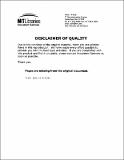Framework for risk informed performance based regulation for nuclear power plants
Author(s)
Abdelkader, Sarah Ali
DownloadFull printable version (3.794Mb)
Other Contributors
Massachusetts Institute of Technology. Technology and Policy Program.
Advisor
Michael W. Golay.
Terms of use
Metadata
Show full item recordAbstract
Currently the electric utility companies are going through a deregulation process that is going to result in market competition for the generating and the transmission companies. The competition is going to be mainly realized by the nuclear power generating companies. The main reason behind this is that existing nuclear power plants have incurred large capital costs that have not been fully recovered. Hence it is predicted that nuclear power plants will not be able to survive the competition. Accordingly there is a need to reduce the cost of operating nuclear power plants without deterioration to plant safety. In addition the regulations delineate the procedures that the plants have to go through for maintenance and surveillance in a prescriptive manner. While the essence of prescriptive regulations is to limit miscommunication and false diagnoses, prescriptive regulations have adversely affected worker cognition and decreased plant workers to routine following robots. These two factors namely the upcoming competition and the adverse effects of prescriptive regulations indicate a need for nuclear power plant operation modification which in turn implies regulations modification. Recently the US Nuclear Regulatory Commission has issued a number of policies and rules that promote the use of risk informed decision making in the regulatory process. These include Safety Goals policy, the PRA policy, the Backfit Rule and the Maintenance Rule where the latter promotes performance rather than prescription based regulations. In addition the NRC has to function under recent congressional budgetary cuts and directives to include Cost/Benefit analysis of regulations, their application and their enforcement. This thesis is concerned with formulating (cont.) an appropriate framework for moving from the current prescription based regulations to risk informed performance based regulations. Hence the goal is to integrate the NRC's new Risk-Informed policies and performance based regulations. There will be particular focus on the Emergency Diesel Generator System for demonstration purposes. This work is funded by the INEL and is pursued with the cooperation of the Milstone-3 power plant of Northeast Utilities.
Description
Thesis (S.M.)--Massachusetts Institute of Technology, Technology and Policy Program, 1998. Original t.p. missing; re-created from June 1998 degree book and abstract. "June 1998." Includes bibliographical references (p. 69-73).
Date issued
1998Department
Technology and Policy ProgramPublisher
Massachusetts Institute of Technology
Keywords
Technology and Policy Program.